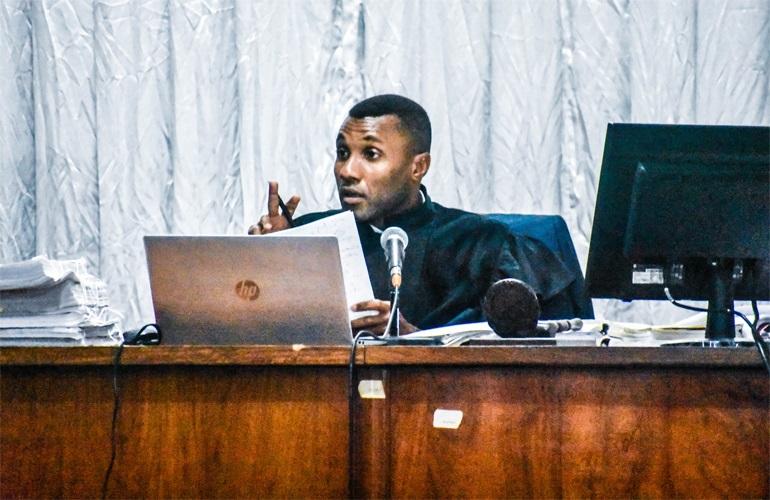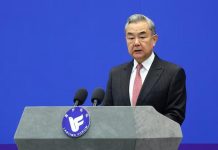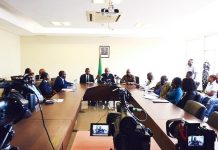Africa-Press – Mozambique. The Maputo City Court has warned prominent lawyer Alexandre Chivale that, if he does not appear voluntarily as a witness in the case of Mozambique’s “hidden debts”, then he will be arrested.
Judge Efigenio Baptista gave the warning on Thursday night, after he had rejected a request from Chivale that he not be called as a witness.
Chivale based his request on the fact that, in earlier stages of the trial, he had represented several of the defendants, and so had a great deal of knowledge of the case. He believed this made it inappropriate for him to testify – though others might argue that it is precisely his deep knowledge that could make him a valuable witness.
Baptista said a court official, accompanied by two witnesses, will go to Chivale’s office to deliver a notification for him to appear in court next Tuesday. “If he does not come voluntarily, an arrest warrant will be issued, and he will come here as a prisoner”, said Baptista. “That’s not what the court wants, which is why I’m urging him to appear voluntarily”.
At the start of the trial, in late August, Chivale represented the former director of economic intelligence in the security service (SISE), Antonio Carlos do Rosario, the private secretary for former President Armando Guebuza, Ines Moiane, and her nephew, Elias Moiane.
At the time of his arrest, in early 2019, Rosario was also chairperson of the board of the three fraudulent companies at the heart of the scandal – Proindicus, Ematum (Mozambique Tuna Company) and MAM (Mozambique Asset Management).
The prosecution was never happy with Chivale’s presence in the courtroom. On the first day of the trial, 23 August, prosecuting attorney Sheila Marrengula asked Baptista to take action against Chivale because he is a director of Txopela Investments, a company effectively run by Rosario which has close links to the Abu Dhabi based group, Privinvest.
Marrengula argued that Txopela is one of the channels for distributing bribes from Privinvest. After Rosario’s arrest, properties registered in his name were seized, including three central Maputo flats, two offices and a shop – but, much to the prosecution’s annoyance, they were handed over to Txopela Investments, as the “bona fide depositary”, despite Txopela’s close relations with Rosario.
To run Rosario’s property portfolio, Chivale set up another company, Dandula Investments, in which he owns 75 per cent of the shares. He also took advantage of the situation to occupy one of the flats (though he claims to own several other houses).
Marrengula demanded that Txopela be sacked as “bona fide depositary”: usually, she pointed out, it was the Department of State Assets in the Ministry of Economy and Finance that acted as the depositary for property seized in criminal investigations. She also urged Baptista to evict Chivale from the flat.
But for almost two months, nothing happened. But then, Baptista revealed that parts of the evidence relating to Rosario’s real estate dealings had gone missing from the case file. 34 pages were missing (out of a total of over 17,000 pages) and these were mostly pages dealing with Rosario’s properties, the very issue Marrengula wanted to question Chivale about. Material concerning Txopela and Dandula was gone, and this compromised Marrengula’s interrogation (although it proved possible to reconstitute most of the missing sections of the case file).
Marrengula was convinced this was no accident, and repeatedly said that the missing pages had been stolen, not that they had simply disappeared.
On 19 October, Baptista agreed with the prosecution that it was intolerable to allow Txopela and Dandula to continue running the properties. Txopela, he pointed out, “is accused of money laundering, and that money was used to buy property, including the flat where Alexandre Chivale is now living”.
A “bona fide depositary” should be appointed by a judge, Baptista added, but in this case that had not happened. He intended to correct that oversight now: he gave Chivale five working days to vacate the flat (Marrengula had wanted 24 hours).
But Marrengula made a new demand, one that was not in her August requests – she wanted Chivale off the case altogether. She based this on the shock declaration by Rosario on 5 October that Chivale “is a SISE collaborator”.
Mozambican law states that a lawyer employed in any capacity by the state cannot represent someone who is taking action against the state. In this case a very large sum of money pits the 19 defendants against the Mozambican state. One of the prosecution’s demands is that the defendants should compensate the state to the sum of 2.9 billion US dollars, plus interest. That would repay much of the damage inflicted on Mozambique by the scandal.
This means that anybody working for the state would be in a clear conflict of interests if he also tried to represent one of more of the defendants. If Rosario was right, and Chivale was a SISE collaborator, then he could not represent any of the defendants.
Marrengula said Rosario was a senior SISE officer, and when he blew Chivale’s cover, there was no reason to disbelieve him, especially as Chivale himself did not react. Chivale was thus working for the state, no matter in how informal a fashion, and so he could not represent people who are opposing the state.
Baptista agreed, and ordered Chivale to cease representing Rosario in this case. Rosario had to find another lawyer, and opted for Isalcio Mahenjane, who was already representing Ndambi Guebuza, the oldest son of former President Guebuza.
The prosecution wants to question Chivale about Txopela Investments and the rest of Rosario’s property interests, all believed to be part of a Privinvest money laundering scheme.
The Public Prosecutor has not charged Chivale with any crimes yet – but is known to be investigating, not only the real estate deals, but also Chivale’s frequent visits to Lebanon, where he has met with Privinvest officials, notably Lebanese citizen Jean Boustani, who was one of the masterminds behind the hidden debts scheme, working closely with three corrupt managers from the bank Credit Suisse (Andrew Pearse, Detelina Subeva and Surjan Singh), as well as with Rosario.
Baptista has adjourned the trial until Monday.
For More News And Analysis About Mozambique Follow Africa-Press






